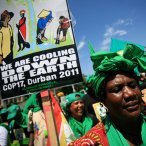
9 de diciembre de 2011 | Entrevistas | Anti-neoliberalismo | Justicia climática y energía | COP 17
Unfair
Interview with the Climate Justice and Energy coordinator of Friends of the Earth International
Descargar: MP3 (4.5 MB)
The new round of negotiations of the United Nations Conference on Climate Change is coming to a close on Friday in Durban, South Africa, without progress in terms of reaching an agreement on the main aspect to tackle the climate crisis: drastic emissions reductions by developed countries.
The developed countries, which are historically responsible for climate change, have once again avoided committing to emissions cuts. They even went as far as being close to reaching a system change in the international fight against the climate crisis that would give way to a system of voluntary, instead of legally binding, cuts.
The Coordinator of the Climate Justice and Energy Program of Friends of the Earth International, Sarah-Jayne Clifton, regretted the developed countries’ lack of action. “We’ve seen unfortunately a further effort from the US, Canada and Japan and the other rich industrialized countries to unravel the existing commitments and what that means is inaction on emissions but also shifting the burden of cutting emissions to developing countries”, Sarah-Jayne told Real world Radio.
The US never actually ratified the Kyoto Protocol, which is the only legally binding agreement that forces developed countries to cut their emissions. Canada claims that it will step out of the Protocol, while Russia and Japan have threatened several times to do the same. The industrialized nations have sought for years that developing countries take on binding commitments, including greenhouse gas emissions cuts, which they are not compelled either under the UN Framework Convention on Climate Change or the Kyoto Protocol.
Rich countries are aiming at China and India, but also at Brazil and South Africa. These emerging economies are not historically responsible for climate change. However, they urgently need to review their production and consumption patterns that are following the steps of the North that has caused climate change.
Clifton said 75% of greenhouse gas emissions in the atmosphere have come from rich industrialized countries, “not China, India, Brazil, but from the US, Canada and the European Union”. The European Union and the US have tried to shift that burden and tried to get rid of their responsibility and tried to push it on to countries like China”. China is the world’s largest polluter, but since its population of nearly a billion people, is the largest in the world. She explained “If you look at the per capita emissions of China, the emissions per person is a lot much lower than in the United States”.
The international coordinator of Friends of the Earth said developed countries should commit to reduce their emissions and to provide funding to the global South for adaptation and mitigation to climate change “then countries like China and India can also take action”.
The European Union has said in Durban that it would be willing to agree on a second commitment period of emissions reductions under the Kyoto protocol. But it put some conditionalities, such as that a “Durban mandate” be provided that would open a new negotiating line to reach a new agreement in the future. Many rich nations see a change for a system that will not force them to cut their polluting emissions. Another conditionality is that carbon markets should be strengthened. These mechanisms open the door to carbon trading and allow rich countries to finance projects in the global South in order to avoid reducing their domestic emissions.
“Friends of the Earth International is completely opposed to carbon trading in all of its forms. We see it as a false solution to the climate crisis”, said Clifton. “Now what we are seeing here is a push to further expand carbon trading to have new types of carbon markets, which further allow rich countries to further avoid their responsibility to cut emissions”.
About the new mandate the EU has been pushing for, the environmental activist claimed that a new negotiating round would “mean five to ten years of inaction when we need urgent action now”. She also regretted the EU’s “destructive agenda of the EU, which unravels the existing bases for international climate action” at the COP
in Durban.
She said that real solutions to climate change were seen outside the International Convention Center, where the official negotiations are taking place. In the streets of Durban there have been “protests, actions and celebration of the real solutions that we actually need to see”, she said. Thousands of peasants, indigenous, fisherfolk, environmentalists, workers, talked about renewable energies, peasant agriculture, agroecology, food and energy sovereignty, community management of forests as “real solutions to climate change”.
“The main message that we need to take from that is that the solution to climate change really lies in strengthening those movements, in strengthening the connections between them”, she said. This strengthening is essential so that the governments that come to the negotiations will advance our interests rather than pushing the interests of the big polluters, the multinational companies and the financial elites.”








